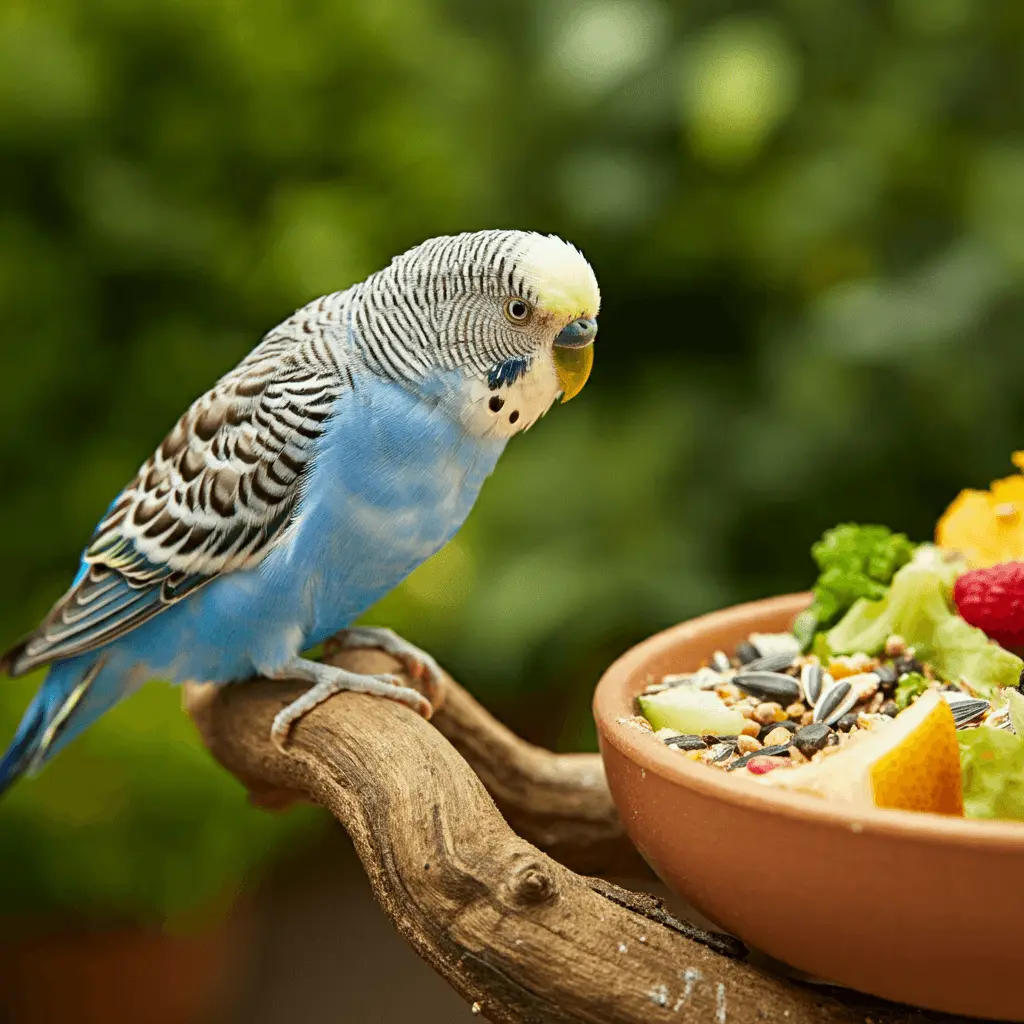Introduction
When it comes to keeping your budgerigar healthy and happy, a proper diet is essential. Understanding what makes up a balanced budgerigar diet can be a bit tricky, especially for new bird owners. Budgies, also known as parakeets, have specific nutritional needs that go beyond just seeds. In this guide, we’ll break down the essential foods your budgie needs to thrive, ensuring a healthy, balanced diet that keeps your feathered friend in top shape.
Whether you’re curious about what fruits and vegetables are safe for budgies, or wondering if pellets are a good option, this post has you covered. We’ll explore the best food for budgerigars, highlight what should be on their daily menu, and share tips on how to feed your budgie in a way that supports their overall health. By the end of this post, you’ll have a clear understanding of the essential foods your budgie needs and how to provide them with a diet that mirrors their natural eating habits in the wild.
Let’s dive into the basics of a budgerigar diet and discover how you can ensure your pet gets the best nutrition possible.
Understanding the Basics of a Budgerigar Diet
A balanced budgerigar diet is more than just filling your bird’s bowl with seeds. While seeds are a staple in a budgie’s diet, relying solely on them can lead to nutritional deficiencies. To keep your budgie healthy, it’s crucial to understand what a proper diet looks like and how to incorporate a variety of foods that meet all their nutritional needs.
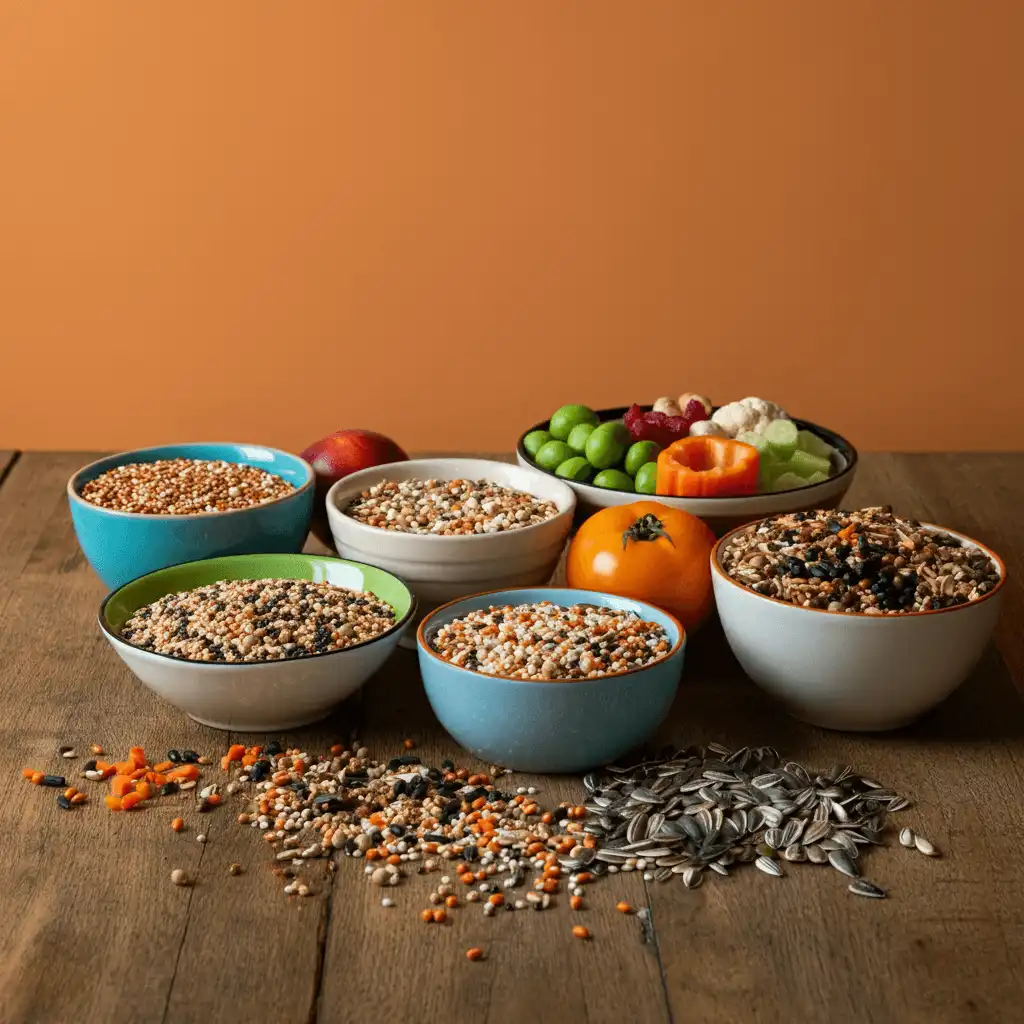
A selection of essential foods for a balanced budgerigar diet, including seeds and fresh fruits.
Seeds as a Foundation: Seeds are a significant part of a budgerigar’s diet, providing essential fats and proteins. However, seeds alone can be high in fat and low in other vital nutrients like vitamins and minerals. That’s why it’s important to mix them with other foods to ensure your budgie gets a balanced diet.
Fresh Fruits and Vegetables: Just like us, budgies need fresh fruits and vegetables to stay healthy. Leafy greens, carrots, apples, and berries are all great options. These foods provide vitamins, minerals, and antioxidants that seeds alone can’t offer. But remember, not all fruits and vegetables are safe for budgies, so it’s important to know which ones to avoid.
Pellets as a Balanced Option: Pellets are often recommended as part of a healthy budgerigar diet because they are formulated to provide balanced nutrition. Unlike seeds, which can lead to picky eating habits, pellets ensure that your budgie gets all the essential nutrients in every bite.
Variety is Key: A healthy diet for budgies isn’t about feeding them one thing; it’s about variety. Incorporating different grains, legumes, and protein sources will help mimic the diverse diet they would naturally find in the wild. Offering a mix of foods can also prevent boredom and encourage your budgie to eat more.
Understanding these basics will set the foundation for a long and healthy life for your budgie. By ensuring a varied and balanced diet, you’re not just feeding your budgie—you’re investing in their well-being.
Essential Foods for a Balanced Budgerigar Diet
Feeding your budgerigar the right foods is crucial to ensuring they lead a healthy and active life. A balanced budgerigar diet includes a variety of foods that provide essential nutrients, helping to prevent common health issues and promoting overall well-being. Here’s a breakdown of the essential foods every budgie owner should consider:
1. Seeds: The Foundation of a Budgerigar’s Diet
Seeds are a staple in any budgie’s diet, but not all seeds are created equal. A quality seed mix should include a variety of seeds like millet, canary seeds, and oats. While seeds are rich in fats and provide energy, they should be complemented with other foods to avoid nutritional imbalances. Over-reliance on seeds can lead to obesity and nutrient deficiencies, so moderation is key.
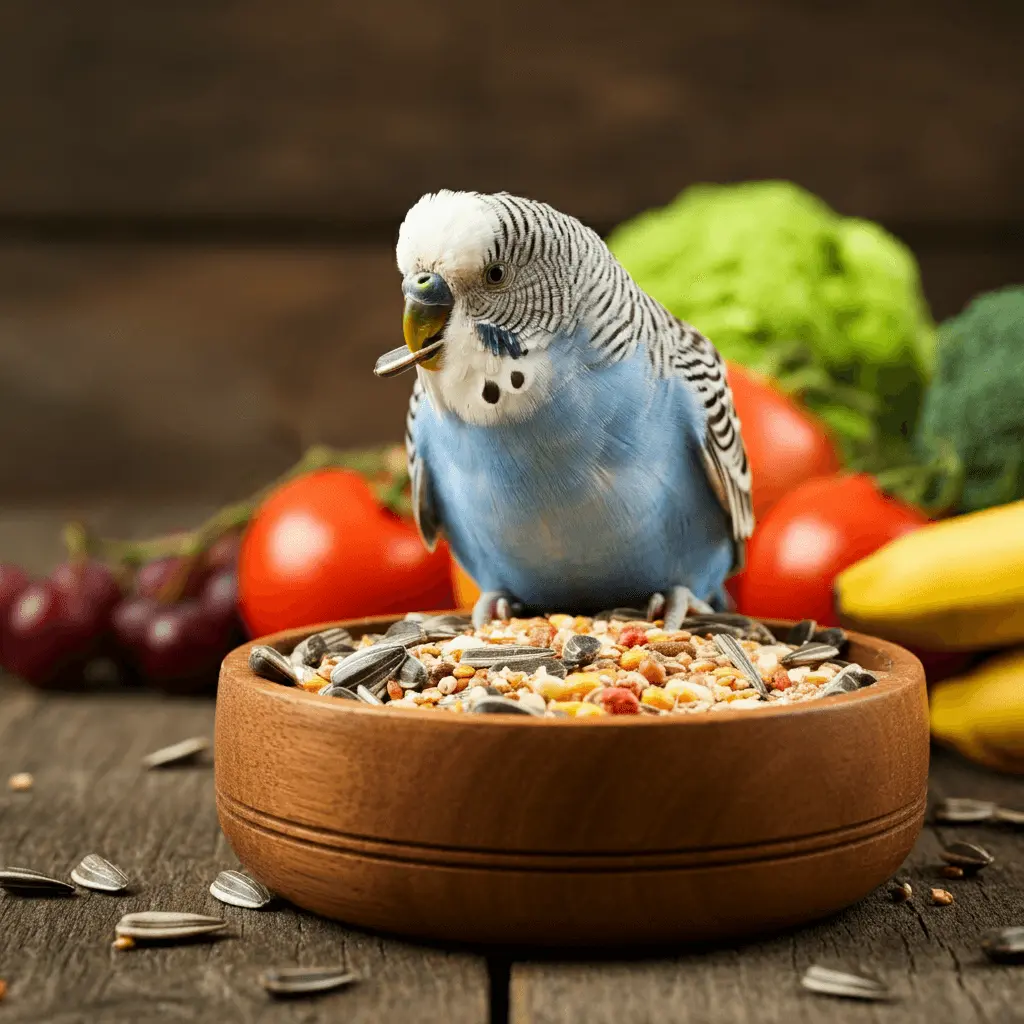
A budgerigar enjoys a meal of seeds, complemented by fresh vegetables, as part of a balanced diet.
2. Fresh Fruits and Vegetables: Vital Nutrients for Health
Introducing fresh fruits and vegetables into your budgie’s diet is essential for providing vitamins and minerals that seeds alone lack. Leafy greens like spinach and kale, along with fruits like apples and berries, are excellent choices. Vegetables such as carrots, bell peppers, and broccoli also offer crucial nutrients. These foods not only add variety but also contribute to a healthier, more balanced diet. Be sure to wash all produce thoroughly and avoid feeding your budgie any toxic foods like avocado or onion.
3. Pellets: A Balanced Nutritional Option
Pellets are a highly recommended addition to your budgie’s diet because they are specifically formulated to meet their nutritional needs. Unlike seeds, which can lead to selective eating, pellets ensure that your budgie receives a well-rounded diet in every bite. Choose high-quality pellets made for budgerigars, and introduce them gradually if your budgie is not used to eating them.
4. Proteins: Important Sources Beyond Seeds
While seeds do provide some protein, it’s important to offer additional sources to support your budgie’s muscle and tissue health. Hard-boiled eggs, cooked beans, and sprouted seeds are excellent protein-rich options that can be offered in moderation. These protein sources can be particularly beneficial during molting periods when your budgie needs extra nutrients to grow new feathers.
5. Grains and Legumes: Additional Sources of Nutrition
Whole grains and legumes are another great addition to a budgerigar’s diet. Foods like cooked quinoa, brown rice, and lentils provide fiber, vitamins, and minerals. These can be offered occasionally to add variety and ensure your budgie is getting a full spectrum of nutrients.
6. Calcium and Minerals: Keeping Your Budgie Strong
Calcium is vital for your budgie’s bone health, particularly for females that may lay eggs. Cuttlebones, mineral blocks, and eggshells are excellent sources of calcium and should be available at all times. Additionally, ensure your budgie has access to sunlight or a full-spectrum light to help them properly absorb and utilize calcium.
Providing a balanced budgerigar diet means combining these essential foods in the right proportions. By offering a mix of seeds, fresh produce, pellets, proteins, and calcium sources, you’ll help your budgie stay healthy, active, and full of life. Remember, a varied diet is not only nutritionally beneficial but also keeps your budgie engaged and happy with their meals.
Foods to Avoid in a Budgerigar Diet
While it’s important to provide a variety of healthy foods for your budgerigar, it’s equally crucial to know which foods should never be part of their diet. Some foods that are safe for humans or other pets can be toxic or harmful to budgies. Here’s a list of foods to avoid to keep your budgie safe and healthy.
1. Avocado
Avocado is a well-known toxic food for budgerigars. It contains persin, a substance that can cause serious health issues, including heart damage and respiratory problems, in birds. Even a small amount of avocado can be fatal, so it’s best to keep this fruit completely out of your budgie’s diet.
2. Chocolate
Chocolate is another food that should never be given to budgerigars. It contains theobromine and caffeine, both of which are harmful to birds. Consumption of chocolate can lead to symptoms such as vomiting, diarrhea, and even death. Keep all forms of chocolate, including baked goods and candies, far away from your budgie.
3. Caffeine
Caffeinated beverages like coffee, tea, and soda are dangerous for budgerigars. Caffeine can cause hyperactivity, heart palpitations, and in severe cases, can be lethal. Always ensure your budgie has access to fresh water and avoid offering them any drinks that contain caffeine.
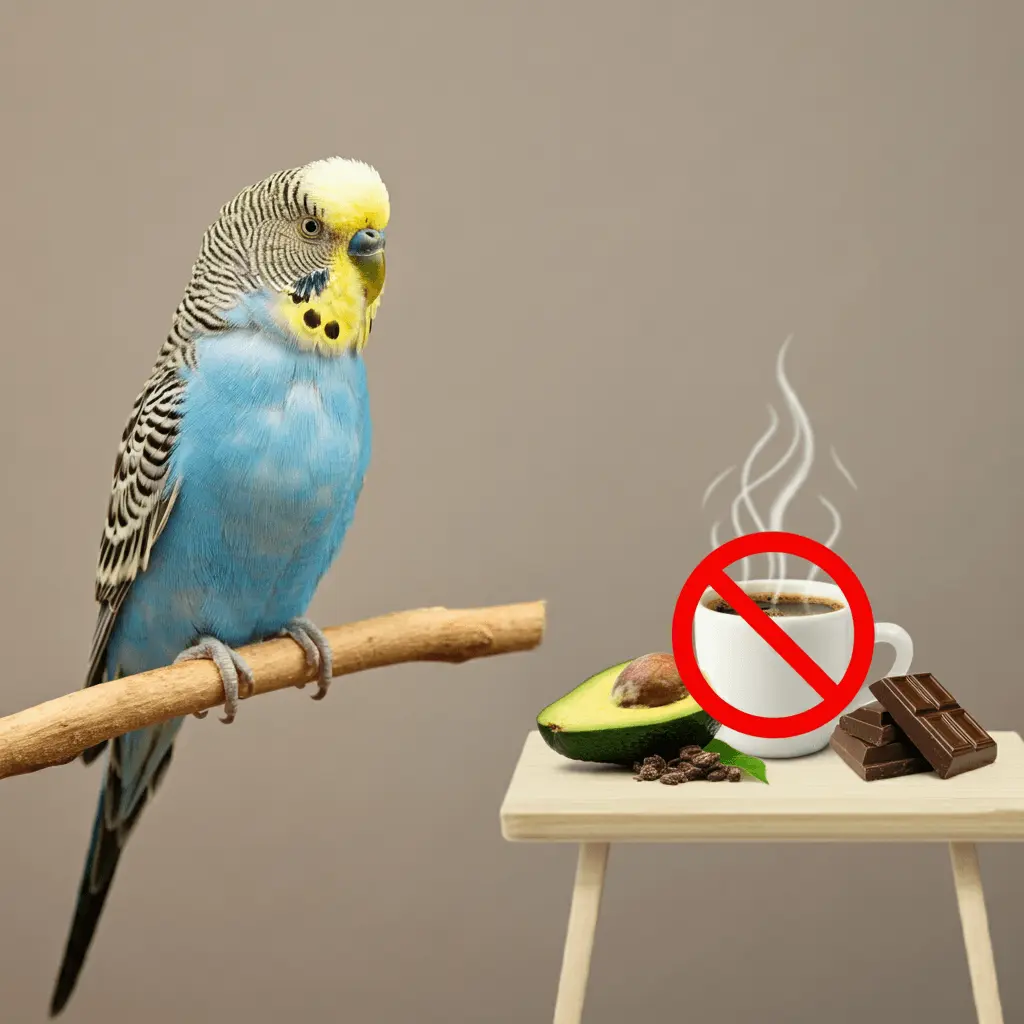
A budgerigar perched near foods that are dangerous for their health, including avocado and chocolate.
4. Alcohol
Alcohol is highly toxic to birds, including budgerigars. Even small amounts can lead to serious health problems, such as impaired coordination, difficulty breathing, and death. Never offer your budgie any alcoholic beverages or foods that contain alcohol.
5. Onions and Garlic
Onions and garlic, whether raw, cooked, or powdered, should be avoided in a budgerigar’s diet. These foods can cause hemolytic anemia, a condition where red blood cells are destroyed, leading to weakness and potentially life-threatening complications.
6. Salty Foods
Foods high in salt, such as chips, pretzels, and processed snacks, are not suitable for budgerigars. Excessive salt can lead to dehydration, kidney problems, and other health issues. Stick to offering fresh, unsalted foods to keep your budgie in good health.
7. Fatty and Sugary Foods
Foods that are high in fat or sugar, like fried foods, pastries, and candies, should be avoided. These foods can contribute to obesity, liver problems, and other health issues in budgerigars. It’s best to stick with natural, healthy options that provide the nutrients your budgie needs without the unnecessary fats and sugars.
8. Apple Seeds and Fruit Pits
While fruits like apples and cherries are generally safe, their seeds and pits are not. Apple seeds contain cyanide, which is toxic to budgerigars, and fruit pits can pose a choking hazard. Always remove seeds and pits before offering fruits to your budgie.
By avoiding these harmful foods, you’ll help ensure your budgerigar stays healthy and lives a long, happy life. Providing a safe, balanced diet tailored to their needs is key to keeping your budgie in top shape. When in doubt, stick to known safe foods and consult with a vet if you’re unsure about introducing new items to their diet.
Creating a Feeding Schedule for Your Budgerigar
Establishing a consistent feeding schedule is crucial for maintaining a healthy budgerigar diet. Not only does it help regulate your budgie’s eating habits, but it also ensures they receive the right nutrients throughout the day. Here’s how to create an effective feeding schedule for your budgerigar.
1. Morning Feeding: Start the Day Right
Budgies are most active in the morning, making it the ideal time to offer a fresh bowl of food. Begin the day by providing a balanced mix of seeds or pellets along with a portion of fresh fruits and vegetables. This morning meal should be the largest of the day, giving your budgie the energy they need to stay active. Make sure to remove any uneaten fresh foods after a few hours to prevent spoilage.
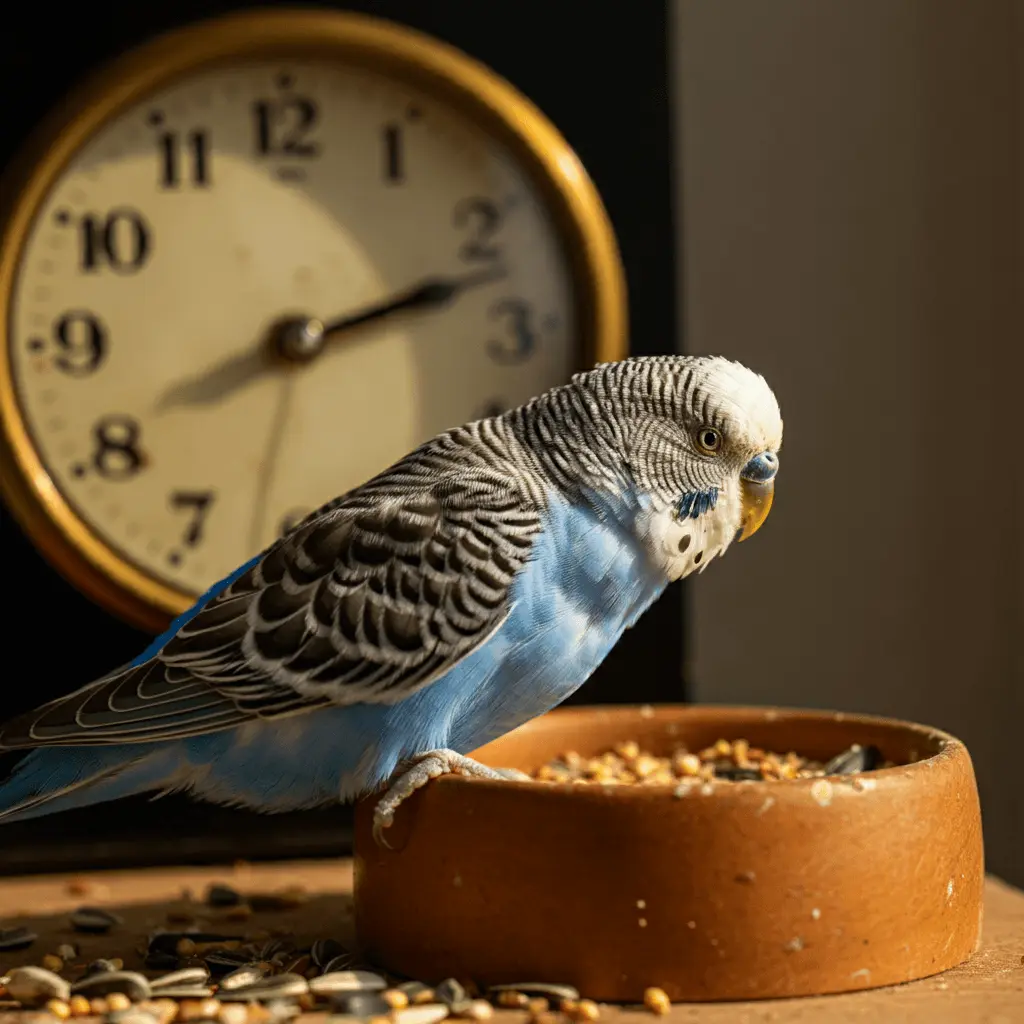
A budgerigar eating from a bowl, with a clock in the background, emphasizing the importance of a regular feeding schedule.
2. Midday Snack: Keep the Energy Up
Around midday, offer your budgerigar a light snack. This could include a small amount of fresh vegetables, some sprouted seeds, or a few pieces of fruit. The goal is to keep their energy levels steady without overfeeding. Midday snacks also provide a good opportunity to introduce new foods and keep their diet varied.
3. Evening Feeding: Wind Down the Day
As the day winds down, offer your budgie a smaller portion of their primary food, such as seeds or pellets. This evening feeding should be lighter than the morning meal, as budgies tend to be less active in the evening. This ensures they don’t go to bed with a heavy crop, which could lead to digestive issues.
4. Consistency is Key
Budgies thrive on routine, so it’s important to feed them at roughly the same times each day. Consistent feeding times help regulate their digestion and ensure they’re getting the right nutrients at the right times. It also helps you monitor their eating habits and spot any potential issues early on.
5. Water: Always Available and Fresh
In addition to a well-structured feeding schedule, make sure your budgie always has access to fresh water. Change their water at least once a day, and more often if it becomes dirty. Proper hydration is essential for digestion and overall health, so never let your budgie go without clean water.
6. Treats: Moderation is Important
Treats can be a fun addition to your budgerigar’s diet, but they should be given in moderation. Reserve treats like millet sprays or commercial bird snacks for special occasions or training sessions. Over-reliance on treats can lead to nutritional imbalances and obesity.
Creating a feeding schedule for your budgerigar is about more than just providing food; it’s about ensuring they get the right nutrients at the right times. By sticking to a regular routine and offering a balanced diet, you’ll help your budgie stay healthy, happy, and full of life. A well-planned feeding schedule also strengthens the bond between you and your bird, as they come to trust and rely on you for their daily needs.
Tips for Encouraging Healthy Eating Habits
Getting your budgerigar to embrace a balanced diet can sometimes be challenging, especially if they’re accustomed to a limited range of foods. However, fostering healthy eating habits is crucial for their long-term health and happiness. Here are some practical tips to encourage your budgie to eat a variety of nutritious foods.
1. Introduce New Foods Gradually
Budgies can be wary of new foods, especially if they’re used to a seed-only diet. Start by introducing new fruits, vegetables, and pellets slowly, mixing them with familiar foods. This gradual approach helps your budgie get used to new tastes and textures without feeling overwhelmed. Patience is key—some budgies may take weeks to fully accept a new food.
2. Make Mealtime Fun and Interactive
Engage your budgie’s natural curiosity by making mealtime more interactive. You can hang leafy greens or fruit slices inside their cage, encouraging them to explore and nibble. Providing food in different ways, such as skewering vegetables on a bird-safe kabob or scattering seeds in foraging toys, can also make eating more enjoyable.
3. Lead by Example
Budgies are social eaters and often learn by observing their flock, including you! If your budgie sees you eating fresh fruits and vegetables, they may be more inclined to try them. Pretend to eat a piece of fruit in front of your budgie, making it seem like a special treat—they might just want to join in.
4. Be Consistent with Healthy Options
Consistency is crucial when encouraging healthy eating habits. Offer a variety of fresh fruits, vegetables, and pellets daily, even if your budgie doesn’t seem interested at first. Over time, regular exposure to these foods increases the chances that your budgie will give them a try. Avoid reverting to an all-seed diet, as this can reinforce picky eating.
5. Limit Treats and Unhealthy Foods
While treats can be useful for training and bonding, they should not make up a significant portion of your budgie’s diet. Overfeeding treats like millet or sugary snacks can lead to obesity and nutritional deficiencies. Instead, reserve these treats for special occasions, and focus on offering nutrient-rich foods as daily staples.
6. Observe and Adapt to Your Budgie’s Preferences
Every budgerigar is unique, and what works for one might not work for another. Pay attention to your budgie’s preferences—if they seem to like a particular vegetable, offer it more frequently, and try pairing it with new foods. Understanding your budgie’s likes and dislikes can help you create a diet plan that’s both healthy and enjoyable for them.
7. Ensure a Stress-Free Feeding Environment
Budgies are sensitive to their surroundings, and a stressful environment can deter them from eating. Make sure their feeding area is calm and free from loud noises or disturbances. A relaxed budgie is more likely to try new foods and develop healthy eating habits.
Encouraging healthy eating habits in your budgerigar takes time and patience, but the effort is well worth it. By introducing a variety of nutritious foods, making mealtime fun, and being consistent with your offerings, you’ll help your budgie develop a balanced diet that supports their overall health. Remember, a well-fed budgie is a happy budgie, and good nutrition is the foundation of a long and vibrant life.
Conclusion: Ensuring a Long and Healthy Life for Your Budgerigar
Providing a well-balanced budgerigar diet is one of the most important responsibilities you have as a bird owner. By understanding the essential foods your budgie needs and avoiding those that can be harmful, you’re setting the foundation for a healthy, active, and joyful life for your feathered friend.
Remember, a balanced budgerigar diet isn’t just about filling a bowl with seeds. It’s about offering a variety of fresh fruits, vegetables, pellets, and other nutrient-rich foods that meet all of your budgie’s nutritional needs. A consistent feeding schedule, combined with the right mix of foods, will help maintain their energy levels, support their immune system, and keep them in top condition.
Encouraging healthy eating habits takes patience, but the rewards are well worth it. A budgie that eats a diverse and balanced diet is more likely to live a long, healthy life, free from the common health issues associated with poor nutrition. By following the tips and guidelines outlined in this post, you’ll not only ensure your budgerigar’s well-being but also strengthen the bond you share with your pet.
In the end, the key to a long and healthy life for your budgerigar is a combination of love, care, and attention to their diet. By making informed choices about what and how you feed your budgie, you’ll be giving them the best chance at a vibrant, fulfilling life.
Frequently Asked Questions (FAQs)
1. What is the best food for a budgerigar diet?
The best food for a budgerigar diet includes a balanced mix of high-quality seeds, pellets, fresh fruits, and vegetables. Seeds should be part of the diet but not the only component, as they lack essential nutrients. Pellets are recommended because they provide balanced nutrition, while fresh fruits and vegetables add vital vitamins and minerals. A varied diet ensures that your budgie gets all the nutrients they need to stay healthy.
2. How often should I feed my budgerigar?
Budgerigars should be fed twice a day—once in the morning and once in the evening. In the morning, provide a larger meal with a mix of seeds or pellets and fresh produce. Offer a smaller portion in the evening. You can also include a light snack, like fresh vegetables or fruits, around midday. Consistency in feeding times helps regulate your budgie’s digestion and keeps them healthy.
3. Can budgerigars eat human food?
Some human foods are safe for budgerigars, while others can be toxic. Safe options include fresh fruits like apples (without seeds), berries, and vegetables like carrots and spinach. However, avoid foods like chocolate, avocado, onions, and anything salty or fatty, as these can be harmful to your budgie. Always research or consult with a vet before introducing new foods.
4. How do I introduce new foods to my budgerigar’s diet?
Introduce new foods gradually by mixing them with familiar foods. Start with small portions and increase the amount as your budgie becomes more comfortable. Patience is key, as budgerigars can be cautious about trying new foods. Offering new foods in different ways, like hanging leafy greens or using foraging toys, can also encourage your budgie to try them.
5. What fruits and vegetables are safe for budgerigars?
Safe fruits for budgerigars include apples (without seeds), berries, grapes, and melons. Safe vegetables include carrots, spinach, kale, and bell peppers. Always wash fruits and vegetables thoroughly before offering them to your budgie, and remove any seeds or pits, which can be toxic.
6. Should I give my budgerigar supplements?
If your budgie has a well-balanced diet that includes seeds, pellets, and fresh produce, they may not need additional supplements. However, calcium supplements like cuttlebone or mineral blocks are important, especially for female budgies. Always consult with a vet before adding any supplements to your budgie’s diet.
7. What foods should I avoid feeding my budgerigar?
Avoid feeding your budgerigar foods like avocado, chocolate, caffeine, alcohol, onions, garlic, and anything high in salt or sugar. These foods can be toxic and cause serious health problems. Stick to safe, natural foods that provide the nutrients your budgie needs without the risks.
These FAQs should help answer some of the most common questions about budgerigar diets and guide you in providing the best care for your feathered friend. A balanced diet is key to a healthy, happy budgie, and understanding what to feed—and what not to feed—will help ensure your pet thrives.

